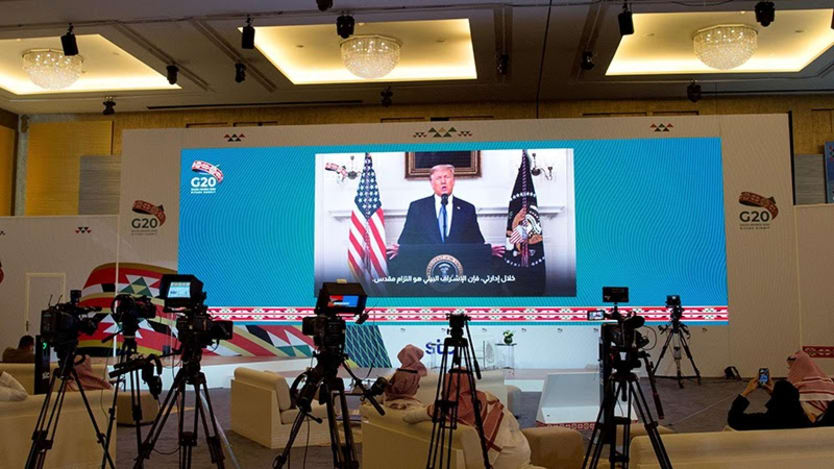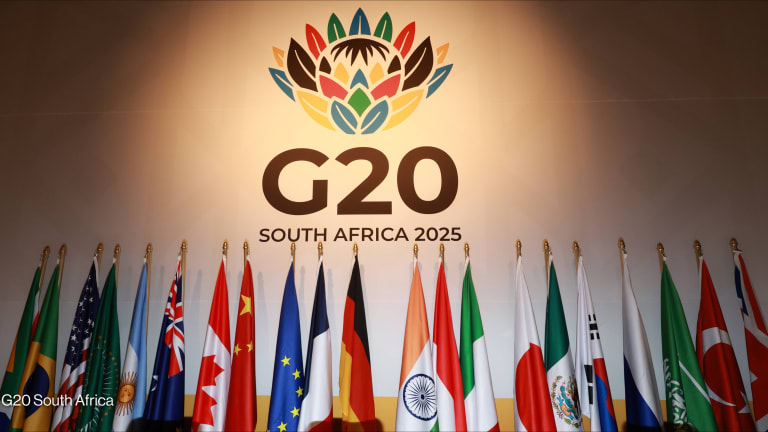Where the US stands on G-20 debt deals, SDRs, and global COVID-19 response

WASHINGTON — The U.S. supports the G-20 efforts to create a new system for debt relief that includes all lenders, and is considering how it might boost support of some International Monetary Fund mechanisms for COVID-19 relief to the world’s lowest-income countries, Brent McIntosh, under secretary for international affairs at the U.S. Treasury Department said Friday.
The U.S. supported the G-20 Debt Service Suspension Initiative because “we thought it was beneficial for pandemic response,” and has worked with others in the G-20 on the debt framework released earlier this month because it was clear the initiative had “some shortcomings,” he said.
Among the challenges was the lack of full participation from some creditors, particularly Chinese creditors, and a lack of voluntary private sector participation, McIntosh said at a virtual Center for Strategic and International Studies event.
“Given the scope of the pandemic, we thought that there were countries that, in addition to just having their debt service payments suspended for a period of time, were going to need actual debt reduction, debt relief that goes beyond what the DSSI provides for,” he said.
“The other thing the current crisis made clear is that the current framework for doing such debt reductions no longer really reflects the realities of government-to-government lending these days.”
G-20 releases debt framework details
G-20 finance ministers met for an extraordinary meeting to discuss debt relief for the world's lowest-income countries. Here are the details of the new framework they agreed to.
Members of the Paris Club, the informal group of official creditors who coordinate solutions for debtor countries that have payment difficulties, have shifted much of their foreign assistance from loans to grants, whereas non-Paris club countries, especially China, rapidly increased lending, McIntosh said.
“We recognized there was a need for a new framework for official debt relief that would bring in non-Paris Club creditors, including China, that bringing China to participate in a multilateral process that has norms and expectations, we think will help avoid some unconstructive dynamics in the debt treatment process — holding up processes, providing insufficient relief,” he said.
Last week, G-20 finance ministers and central bank governors approved a new debt framework. The framework was praised as a step forward but raised some questions from experts, including the amount of private sector participation there would be, what type of debt relief would be provided, whether China would fully participate, and that it leaves out middle-income countries struggling with debt burdens.
“We think there needs to be more debt reduction because there is a good deal of uncertainty both because of the pandemic and because of the fiscal position that a lot of countries find themselves in.”
— Brent McIntosh, under secretary for international affairs, U.S. Treasury DepartmentMcIntosh said the framework is “conceptually a good idea” but does need to work in practice, which will “require a real concerted action and full faithful participation by all creditors.”
The framework will review debt needs on a case-by-case basis, using IMF and World Bank Group debt sustainability analysis and the assessment of creditors.
There are, however, some different interpretations about what type of debt restructuring will take place. In comments about the G-20 debt agenda ahead of the G-20 leaders summit, China’s minister of finance, Liu Kun said that, “According to the Common Framework, in principle, debt treatments will not be conducted in the form of debt write-off or cancellation.”
McIntosh indicated Friday that the U.S. sees the agreement a bit differently.
“Our take on debt sustainability is, sometimes debt sustainability requires rescheduling and sometimes it requires debt reduction. And the common framework recognizes that … countries are in different places with regard to that. And so the common framework that we're using represents a shared political commitment to take a case by case evaluation of each country's situation and attempt to address it in a way that is specific to that country,” he explained.
McIntosh said that “on the whole,” the U.S. is supportive of countries asking for debt reductions when their debt burden is unsustainable.
One of the concerns raised about the DSSI and the framework is that they only apply to low-income countries, while there are middle-income countries and some small island states that are also struggling under significant debt burdens. There is no consensus at the G-20 about expanding the debt efforts to a broader group of countries, but the U.S. supports doing so, McIntosh said.
“We think there needs to be more debt reduction because there is a good deal of uncertainty both because of the pandemic and because of the fiscal position that a lot of countries find themselves in,” he said.
While there have been several critiques about the COVID-19 response by international finance institutions, including one from the Overseas Development Institute and one from the Center for Global Development last week, McIntosh said that they have done a “commendable job.” He said that having worked hand in hand with them he can “attest to the speed and rigor with which they’ve moved.”
The U.S. believes there is a need for additional assistance to low-income countries by IMF, but McIntosh said that it has the funding it needs to support those efforts, including through the Catastrophe Containment and Relief Trust, the Poverty Reduction and Growth Trust, and other existing instruments.
The U.S. administration is not supportive of additional special drawing rights allocation because “in our view it is not a targeted or active way to get resources out to countries given the way SDRs are distributed,” he said, adding that most G-20 countries have unused SDRs on their balance sheets.
The U.S. Treasury Department is exploring how it might use existing SDRs to fund those IMF mechanisms, but it will need approval both from the administration, specifically the Office of Management and Budget and from Congress, he said.
Search for articles
Most Read
- 1
- 2
- 3
- 4
- 5








